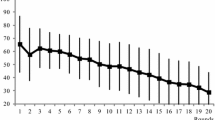Summary.
In the model presented, a buyer uses competitive bidding to facilitate her purchase of a good (the primary good of the exchange). Not included in the original purchase is the possible procurement of a good related to the original purchase: the supplementary good. The primary and supplementary goods are closely related; knowing a bidder's cost of producing the primary good implies that the buyer can infer the bidder's cost of producing the supplementary good. I show that a bidding mechanism for the primary good will fail to ensure an efficient allocation if the buyer learns the bid of the winner and the price of the supplementary good is determined through sequential bargaining.
Similar content being viewed by others
Author information
Authors and Affiliations
Additional information
Received: August 22, 1996; revised version: June 23, 1997
Rights and permissions
About this article
Cite this article
Waehrer, K. The ratchet effect and bargaining power in a two-stage model of competitive bidding. Economic Theory 13, 171–181 (1999). https://doi.org/10.1007/s001990050246
Issue Date:
DOI: https://doi.org/10.1007/s001990050246




